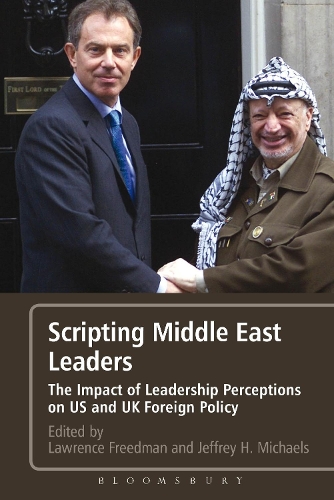
Scripting Middle East Leaders: The Impact of Leadership Perceptions on U.S. and UK Foreign Policy
(Paperback)
Available Formats
Publishing Details
Scripting Middle East Leaders: The Impact of Leadership Perceptions on U.S. and UK Foreign Policy
By (Author) Sir Sir Lawrence Freedman
Edited by Dr. Jeffrey Michaels
Bloomsbury Publishing PLC
Bloomsbury Academic USA
14th February 2013
United States
Classifications
Tertiary Education
Non Fiction
International relations
Political leaders and leadership
320.6
Physical Properties
Paperback
192
401g
Description
Both the US and the UK seemed caught off-guard by the uprisings in Libya and Egypt and policymakers had to deal with leaders that switched from being allies to "pariahs." This collection of essays, written by leading scholars, examines the evolution of British and American perceptions of "adversaries" in the Middle East since the Cold War. It traces the evolution of how leaders have been perceived, what determined such perceptions, and how they can change over time. It shows that in many cases the beliefs held by policymakers have influenced their policies and the way they adapted during crisis. Each essay focuses on a Middle East leader, such as Nasser, Assad, Hussein, or Ahmadinejad, discussing what these leaders' objectives were perceived to be, the assessments of their willingness to take risks or negotiate, and how such assessments changed overtime and were evaluated in retrospect. This groundbreaking contribution to the literature on leadership attitudes and perceptions in policymaking toward the Middle East will appeal to anyone studying foreign policy, Middle East politics and political psychology.
Reviews
This is really a marvelous project - timely, important, and with absolutely first-rate authors. Students, professionals in the field, and members of the interested public will find it fascinating and instructive. -- Robert Jervis, Adlai E. Stevenson Professor of International Affairs, Columbia University, USA
Freedman and Michaels have assembled a powerful set of contributors in support of their model of how the US and UK have naively scripted Middle East leaders as players in Western dramas, often casting the same leader at different times in roles as needed reformer, ally of convenience, villain, diabolical enemy, outlaw or irrelevance. This collection of essays should be read by any who reach for arguments from the past for action (or to justify inaction) using slogans such as Munich, Pearl Harbour, Suez, Vietnam, and most recently Afghanistan. This is a substantial contribution to our understanding of the unconscious influences on Western policies towards the Middle East: those who conceived the 2003 invasion of Iraq would have benefited especially from the analytic essay on strategic scripts by Professor Freedman that opens this book. -- Sir David Omand GCB, former UK Security and Intelligence Coordinator 2002-2005
This collection of well-researched essays describes the images that American and British policy-makers have formed of their ten major Middle East adversaries over recent years from Abdul Nasser through Arafat and Saddam Hussein to Bashar al-Asad and Ahmadinejad and how these images have influenced their policies. The portraits are revealing and intriguing, even entertaining. Academics who cannot indulge in entertainment should still find the time to read the valuable introductory chapters, illuminating, with reference to recent advances in cognitive science, the processes by which policy-makers, inevitably swayed by complex emotions, try to make sense of the information coming to them, and devise strategic scripts as a basis for action. -- Sir Harold Walker, Former British ambassador to Bahrain, the UAE, Ethiopia and Iraq
Summing Up: Recommended. Upper-division undergraduate, graduate, research, and professional collections. -- A. R. Abootalebi, University of Wisconsin, Eau Claire * CHOICE *
Author Bio
Jeffrey Michaels is Research Associate in the Department of War Studies at King's College London. Prior to this, he served as a Lecturer with the Defence Studies Department, and also as an intelligence officer attached to the US European Command and the Pentagon's Joint Staff. Lawrence Freedman is Vice-Principal and Professor of War Studies at King's College London. He has held research appointments at Nuffield College Oxford, IISS, and the Royal Institute of International Affairs. Elected a Fellow of the British Academy, he was awarded the CBE and the KCMG (Knight Commander of St Michael and St George). In 2009, he served as a member of the official inquiry into Britain and the 2003 Iraq War.
